When I first started intermittent fasting in 2017, I don’t remember finding nearly as much content on the subject on the Internet. Articles on big websites like Healthline or WebMD seemed to be advising against it pretty strongly.
Now even they, in some articles, came up with good things to say on the subject. And everybody and their mother seemed to have created it’s very own list of benefits about fasting.
So, I wanted to create the ultimate resource on the benefits of fasting, not only telling you you’ll lose weight and feel more energized but literally every benefit, even side ones, I’ve learned about by reading articles or studies and through my own 3+ year of experience in the practice.
During this time I converted friends to intermittent fasting and prolonged fasts and they also gave me their feedback, I spent some time talking about it and asking questions because it’s such a fascinating subject. And they came up with even more benefits!
I will start by talking about everyday life. Because you don’t want to start a list with yet again some guy telling you “fasting is good for burning fat”. I’ll get to that of course, but I wanted to start with what I’ve learned from experience.
The last chapter benefit, to me, is the single greatest benefit you’ll get from implementing any type of fasting.
A big disclaimer (before I begin)
I am not a doctor, I don’t own a Ph.D., I’m not specialized in fasting, I’m just a regular guy compiling information on a subject I love and that really helped me in my life.
I’ll be talking about the effects fasting could have on severe conditions, I’ll be backing these claims with studies, but don’t just take my word for it. Do your own researches and follow your doctor’s orders.
The idea of this article is merely to present to you how fasting can improve your life or condition, don’t suddenly stop your medication and start fasting instead. Educate yourself on the subject, compile information, it could help you talk to your doctor about it with a good understanding of the subject.
I really want to put emphasis on this: I want to help you open up to the benefits fasting can have, help spread the word. But I don’t want to make people think that’s the miracle cure for everything.
1. Increase your willpower
Did you know that your willpower was finite? That it is like a muscle that you can train? Willpower can actually be measured through heart-rate variability (HRV). In short, the variations in the interval between each heartbeat.
HRV is an important factor and the higher HRV, the easier it will be to deal with stress, ignore distraction, delay gratification, etc. To summarize, the higher HRV, the greater the willpower.
When you fast, you’re training your willpower muscle, since you’re forcing yourself not to eat when your hungry, not indulge in sugar drinks, etc. But implementing fasting in your life will also improve your diet, energy and sleep quality. All important factors to increase HRV.
In a study, several patients did a 4 months money management experience, where they had to log every expense they did, all the while under a pretty tight budget. Meaning they couldn’t go out much (restaurants, movies, etc.).
The willpower exerted during these four months actually spilled on other aspects of their life, they drank less coffee or alcohol, started exercising, etc.
Take it from me: since I started fasting in 2017, I exercise, take cold showers and meditate every day for example. Oh, and I also quit my job and started my company! I don’t think the only reason for this is fasting, but I’m pretty sure it helped.
Through fasting, you’ll get used to increase your willpower to the extent where you’ll need to put yourself in some kind of discomfort/discipline with other aspects of your life, you’ll love creating new healthy habits.
2. Less stomach bloating and going to the bathroom
I have struggled with bloating and digestive problems since my adolescence. I was pretty sure I was suffering from a slight case of irritable bowel syndrome. Fasting completely changed that.
Of course, it still happens sometimes when I eat too much, carb load on a meal, when on vacation and eating 3 times a day. But most of the time, meaning 90% of the time, I feel less bloated and my stomach feels fine.
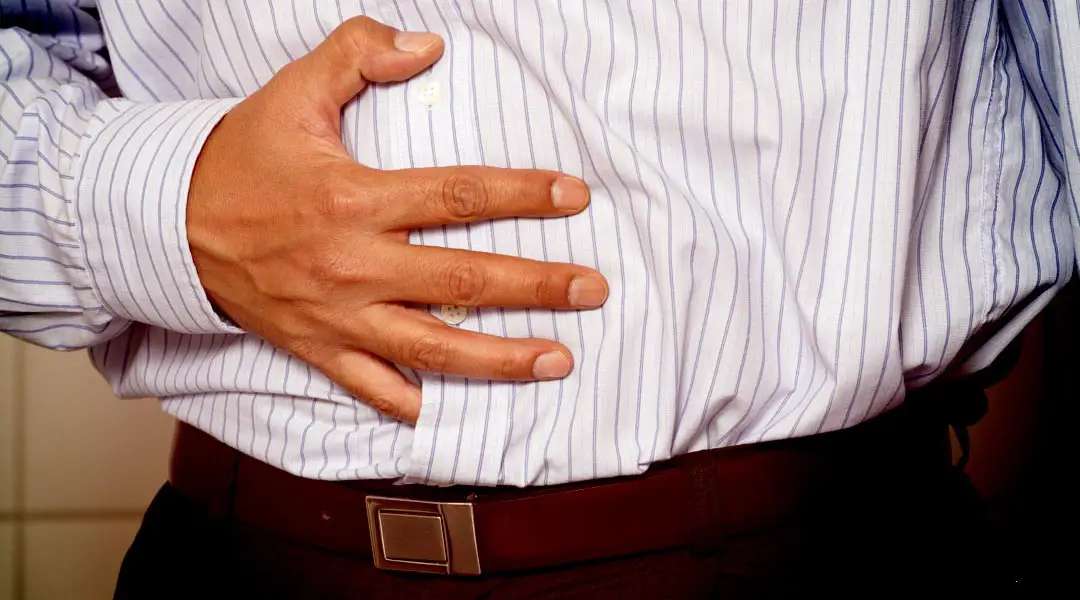
When fasting, you’ll be getting tons of water and you’ll be giving your digestive system a break. And you’ll give him a break almost every day, by reducing your eating window. And also reducing the amount of food you eat.
If you keep hydrated, eat less and less often, you’ll definitely reduce bloating and bowel movements. Before intermittent fasting, I was going to the bathroom 3 to 4 times a day, now hardly one time. Less bloating, less gas, fewer bowel movements.
Let me also add a side note on this: I also greatly reduced carbs consumption in the last year, especially refined carbs, keeping them to a minimum during the week. I can really feel it improved my condition even more.
3. Better sleep
In order to explain how and why you’ll get better sleep, let’s first take a look at how fasting will mess with your sleep at first. The first reason being your internal body clock, the second the fact that you’ll be forcing your body to burn fat for energy.
We all have several internal body clocks (in the brain, liver, heart, etc.), which is called the circadian rhythm. What and when you eat will have a great impact on circadian rhythm.
In short, from the first bite of food you get in the morning until that last thing you eat in the evening, this will tell your body how to set the circadian rhythm.
So of course at first, you’ll be messing up with this rhythm, since you’ll be eating twice, or even once a day instead of 3 times or more. Your body is a machine of habit, altering this rhythm won’t be easy and it will fight it at first.
The second thing that’ll impact your energy and sleep quality is turning your body’s machinery into burning fat instead of glucose. When fasting, once glycogen stores, sugar in the body, are depleted after around a day, your body will have to use fat for energy.
But it’s not used to do that. That will lead to fatigue, headache, brain fog, also known as keto flu. Your body will fight against getting into ketosis and trigger those side effects.
After a while though, once you’re body’s used to the newly imposed circadian rhythm and to ketosis, all these effects will disappear and make way for actual benefits.
First, when doing any type of fasting, you’re restricting your eating window. This study has shown that patients reducing their eating window from 14h to 11h experienced better sleep quality. Because you’re actually creating a stronger circadian rhythm for your body.
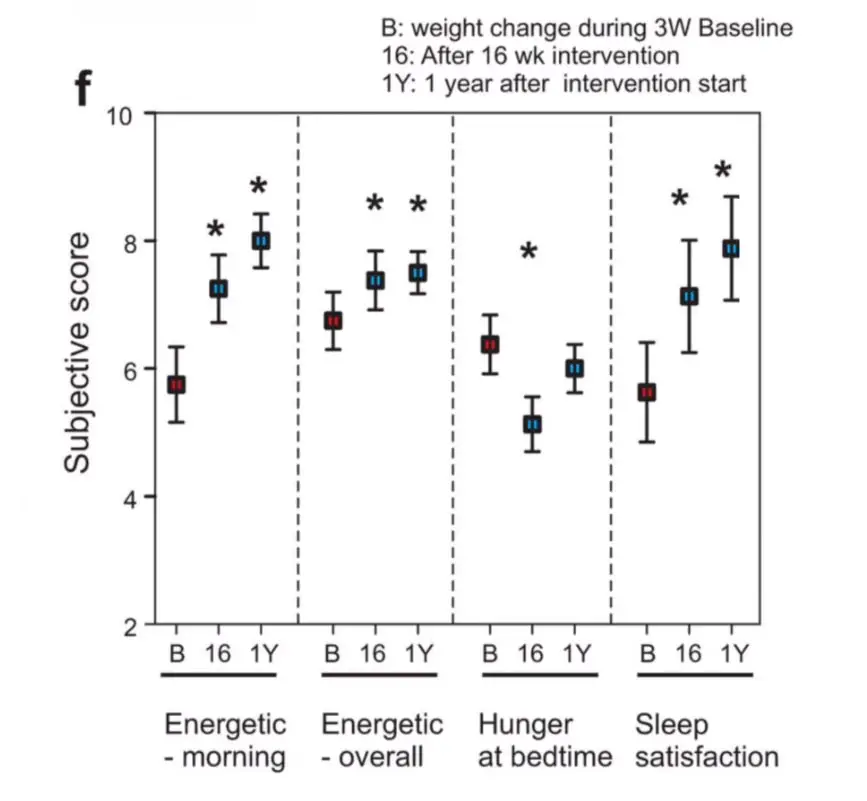
Second, insulin levels have a direct impact on melatonin secretion. Melatonin is the sleep hormone. In short, your body prefers to eat and digest food during the day. The less you eat right before bed, the better the sleep quality.
Fasting will also increase insulin sensitivity, by reducing insulin levels in the body. This means you’ll get far less insulin floating around in the blood. The lesser insulin, the better the production of melatonin.
Lastly, I talked in my previous point about feeling bloated and how fasting will help with that. Going to bed feeling well, without any stomach ache or gas will be easier when fasting.
I did a whole article on how keto and fasting affected sleep and energy, if you want to know more about that, check it out.
4. Help quit/reduce smoking
This one benefit comes from a friend I often talk about here. She’s a smoker and she also experiences with fasting. She’s the catalyst for two articles I did: will smoking break a fast and this one where I wonder if fasting can help you quit smoking.
The short answer? It won’t cause you to quit smoking directly. But through other pathways, it could help reduce the habit.

First, as I said earlier, fasting will train and improve your willpower, there’s no question about it. You’ll impose discipline on yourself, embrace discomforts and this can lead to other drastic changes in your life.
I mentioned earlier a study on money management and the willpower spilling on other parts of their life. They drank less coffee and alcohol, exercised more, but also, smoke less.
Second, smoking is a bad habit. And it is exactly that: a habit. Like any habit, it needs a certain cue to be triggered. So, you’re a smoker, you just had something to eat (that’s your cue), you smoke a cigarette (that’s called the pattern) and you feel better (that’s the reward). We could see the same pattern with feeling stressed out or anxious.
Every habit works like that, good or bad. If you want to learn more about habit formation, I strongly advise you to read a great book called the Power Of Habits, which I talked about here. Not eating for a whole day, improving your mood and overall energy with fasting, all these side effects could help reduce smoking from a habit standpoint.
Third, my friend who’s intermittent fasting even did several days of fasting while smoking. Again, I told her it was a bad idea, but she did it anyway.
She was used to getting a smoke with her coffee, so at first, she had her cue to smoke quite often. But after the third day, cue or not, she started smoking less, like not even half of what she was used to smoking on a normal day.
I asked her if the didn’t like the taste as much, if it was making her dizzy or ill, etc. Which would be perfectly fine assumptions. But no, she just didn’t feel the urge to smoke as often.
Lastly, I almost always speak about fasting for weight loss, but when done for spiritual (or even simply detox) reasons, it can have surprising effects on bad habits. For example, the practice of Ramadan really helped people reduce or quit smoking altogether.
5. Feel free to eat what you want
To sell intermittent fasting to people I often talk about that. You’re not counting calories, you’re not replacing cream with milk, looking for light mayonnaise or other stupid food industry aberrations. You’re not eating as often, so you’re eating less, so you eat what the hell you want!
I know that seems counter-intuitive when speaking about diet to say eat what you want. Eating pizzas or hamburgers every day as your only meal is stupid. You shouldn’t be fasting a whole day and then getting junk food just, well, because.

I simply want to put emphasis on the fact that you will be less stressed about the way you eat. If you want to lose a lot of weight, of course, you should also change your diet, eat fewer carbs, more healthy food, reduce or cut sugar altogether, etc.
In the case where you’re just trying to lose a bit of weight and stabilize it though, when you eat and how much will be impacted greatly by intermittent fasting. And I believe it’s more important than WHAT you eat.
Anyway, as you’ll see in my next point, if you’re implementing fasting you’ll also get used to eating healthier meals and crave sugar and junk food less.
6. Less appetite
There are two hormones controlling hunger in the body: ghrelin and leptin. Ghrelin will regulate your appetite and leptin, which is a hormone found in fat cells, will tell you you’re satiated.
The first big worry everybody has with fasting is hunger. The meer thought of not eating for a day and being hungry terrifies people. If you don’t eat for several days, you should get increasingly more hungry, should you not?
It’s quite the opposite actually. This study conducted on six healthy volunteers, men and women, used to eat three times a day, had them fast for 33 hours. During the fast, ghrelin secretion in the blood was measured every 20 minutes.
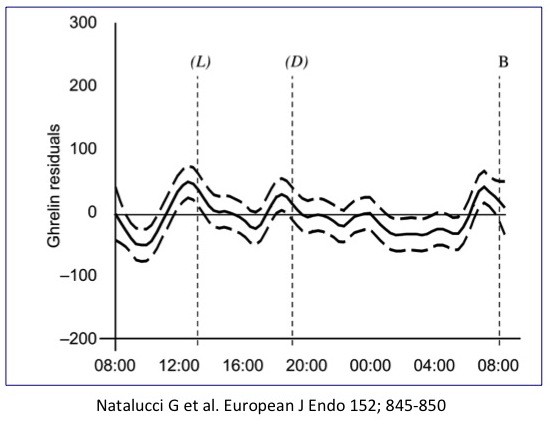
In this graphic of the experiment you can see ghrelin levels being very low in the morning, meaning that’s when you should be less hungry, but that’s also when you’ve spent the longest time without eating. Levels rise again at lunch and at dinner.
You might think if they raise, then that’s your body telling you to eat. Yes, but no. Since ghrelin levels don’t continuously rise, they peak at the time you’re used to eating. Times when your circadian rhythm knows you usually eat, then fall back down.
A one day experiment doesn’t exactly tell us that fasting can cure hunger. Here’s a study that was done for 3.5 days on 33 patients, lean and obese. You can see in the graph below that over the fast, overall ghrelin levels decreased.
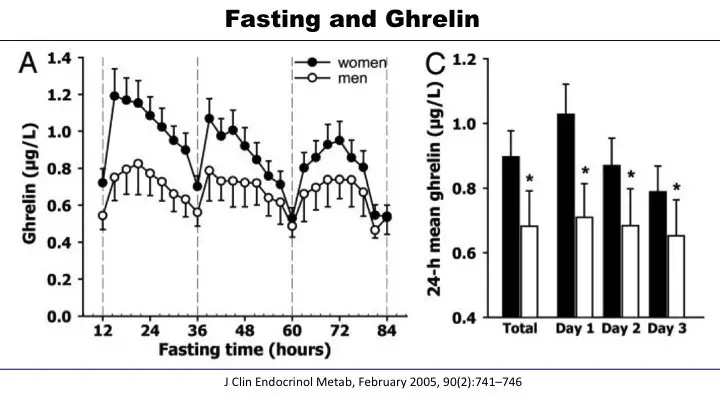
Again, the less they ate, the less ghrelin secretion, the less appetite. This is particularly apparent with women as you can see, where ghrelin levels in men do go down, but far less. I’ll talk about this in my next point.
Now from a personal standpoint, I can say that’s a hundred percent true. Without even realizing it, intermittent fasting really reduced my overall appetite and, as we’ll talk about in my next point, my cravings.
What’s funny is the whole “you’ll starve and then eat more to compensate” thing. Try not eating for a day and be amazed at how quickly you’ll feel satiated when you’ll break your fast with dinner.
7. Reduce cravings
Going back to the previous point on appetite, I mentioned that women seemed to have more ghrelin secretion than men. Reading about this, I’ve seen many saying that this could come from reduced cravings.
Meaning, the women patients in this experiment, and even any woman for that matter experience more cravings for sugar, or refined food. And according to this study, it might be on the point.
Not because women have less willpower than men when it comes to this, but, to quote the study:
Furthermore, for women, there are sex hormone-related variations in craving and food cue reactivity that may hinder dieting and weight loss attempts.
The study also concludes that further researches should be done on craving variations during menstruations.
But wait, why am I talking about that? Because if women, overall, suffer from cravings more than men, then this graph could help emphasize that fasting helps reduce those cravings. With ghrelin levels being almost similar at the end between men and women:
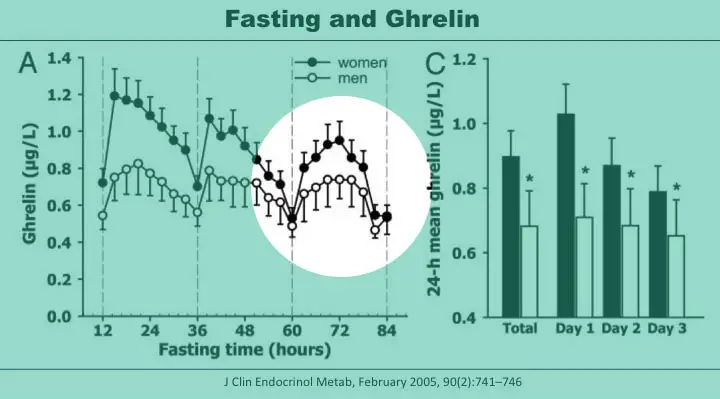
A bit of a stretch? It might be, so let’s look at this other study, which took a look at brain stimuli people got when seeing food slides. They studied the level of stimuli both in fasting obese patients and dieting ones.
At the end of the three weeks experiment, reaction to craving didn’t seem to change in people dieting, but the stimuli got close to zero for the fasting group.
On a personal note, did the implementation of fasting in my life since 2017 reduced cravings? Yes, but not necessarily sugar cravings. I’ve never been a big sugar guy, so what I felt hit the most was carbs cravings. Pasta, pizza, bread, I love these, but I can simply do without most of the time.
Before I was eating pasta three times a week, it was my go-to meal. And don’t even get me started on bread!
Now that I’m fasting and I cut down the carbs, I enjoy eating these more when I get to, but most of the time I don’t crave them. And usually, after indulging, I’m good for a few days.
8. Prevent jet flag
Again I’m going to talk about circadian rhythm, your internal body clock. It’s regulated mostly by the way you sleep and the way you eat, right? And it’s also regulated by day/night cycles. That’s why you naturally feel sleepy when the sun goes down and awake when it goes up.
Jet lag is such a drag because you’ll be messing up your circadian rhythm in two ways :
- Traveling several time zones will disrupt the day/night cycle
- Eating during this period, even if it’s at times when your body’s used to eat, could mess your rhythm even more

This study done on mice found out that the internal body clock seemed to be put on hold when food was scarce. Since we share our dorsomedial nucleus, that responds to hunger, with mice, this could actually also apply to us.
There’s an actual diet, used by the military, called the Argonne Diet, designed to prevent jet lag. The idea is to calculate when you’ll eat first upon arriving on destination. You’ll be alternating feasting and fasting. On the day before and the day of the flight, you’ll be fasting and breaking the fast with a regular meal at the right time at your destination.
I don’t really think you need to follow the Argonne Diet exactly, you could simply eat normally, fast for two days before and during the flight, then break your fast at the right time. If you’re used to fasting, two days is a breeze and you don’t need to feast to make it work.
Sadly, I cannot vouch for this one. Since I discovered fasting could help with jet lag, I haven’t crossed several times zones. Moreover, eating and drinking on planes is half the fun, and since I only travel for pleasure, I don’t think I’ll try it.
But if you’re a frequent flyer, give it a try! If you want to know more about this subject, I did a whole article on fasting and jet lag.
9. Help on a hangover
Being hungover is not a natural state for your body. It wouldn’t make sense to advocate fasting as a way to improve or even treat a hangover, mentioning how cavemen used to fast after a heavy day of drinking.
When you’re suffering from hungover, this means your body will be:
- Dehydrated, even though it doesn’t seem to correlate, according to this study, to the severity of the hangover
- Full of acetaldehyde, a toxic compound made by your body when breaking down ethanol
- Suffering from higher levels of inflammation through a molecule called cytokines. These molecules usually trigger fever or inflammatory responses to infection. But alcohol messes with your immune system in many ways
- In a detoxifying state, most of its energy will be put into the liver kicking alcohol out of your system

To summarize, you’ll be feeling pretty bad because the toxics leftovers from alcohol will make you feel bad and your body will take up most of your energy to detoxify itself.
Meaning fasting on a hungover really won’t prevent weight loss and fat burning since your body will have too much to do to enter ketosis anyway. So if fasting serves no real purpose weight-wise, why should you?
If you read my article on fasting on a hangover, you might already have read that I’m not especially advising that your fast on a hangover. You can, but it’ll make the day harder and I’m not sure it’ll help reduce your hangover.
But as you’ll see later in this article, fasting has powerful anti-inflammatory benefits. And some of the discomforts you’ll be experiencing on a hangover comes from inflammation.
Moreover, since I wrote the article I thought more of the way I ate on a hangover day. And I found that drinking a lot, getting out of the house, staying active and not eating for most of the day was a powerful way to recover.
Fasting alone won’t change your condition, but if I force myself to stay active, I felt way better when I didn’t eat for the whole day, than when I had a big lunch.
It might or might not be for you, but why don’t you try?
10. More focused
When you’re fasting, your body will turn to your fat stores for fuel, entering a state known as ketosis, in which your primary energy for the brain and tissue will be through ketones or ketone bodies.
What’s more, your brain prefers to get its energy from certain ketone bodies, such as acetoacetate, rather than glucose. And you know what running on ketones will do? Improve mental performances and increase focus.
This study on the effects of the ketogenic diet on physical and cognitive performance on rats found that when supplemented with ketones, rats were able to solve a maze up to 38% percent faster.
This other study conducted on mice revealed that chronic intermittent fasting improved cognitive functions and brain structure. When faced with the Barnes maze they had better learning capability and more memory.
Another side effect of fasting is that it increases brain-derived neurotrophic factor in the body, BDNF for short. This protein promotes the growth of new brain cells.
11. More energized
By now if you’ve read any articles on the benefits of fasting, you’ve seen people saying that it will give you more energy. People commonly think that they will feel tired and won’t be able to lift heavy weights when fasting.
Lack of energy can happen when fasting, mostly at the beginning if you’re implementing intermittent fasting and on the second or third day specifically if you’re doing a prolonged fast.
But once your body kicks into ketosis, meaning it starts relying on fat stores for energy, once you go past the first symptoms of fatigue, fogginess or even headaches you can experience with turning to keto, you’ll definitely feel more energized.
And think about it, our ancestors didn’t eat every day, what if on the days they couldn’t eat they felt sore, tired, unable to lift weights, run, etc.? How do you think they were able to fast several days and still go hunting and gathering food?
Our body is very strong at protecting itself and it has many important survival mechanisms. Relying on fat stores for energy, through ketone bodies and amino acids will keep you energized and most of the time, even give you more energy than getting glucose.
Remember that there is no necessary glucose, your body is perfectly able to turn fat and proteins into energy and fat stores and then turning this back to sugar for energy.
The last thing I want to mention: when you skip a meal, you’ll feel more energized for the simple reason that you won’t have to digest food. You know how tired you can get after a meal don’t you? It won’t happen with fasting.
12. Save time
Let’s get into the practical world now. I won’t be talking to you about studies or the science of time-saving. You won’t be eating, so, you’ll get more time to do something else. Pretty simple right?
You shouldn’t be fasting specifically to save time, there are hundred other (actually, more like 30+) benefits you can get from fasting, without focusing on this. But it’s a great side-effect of fasting.
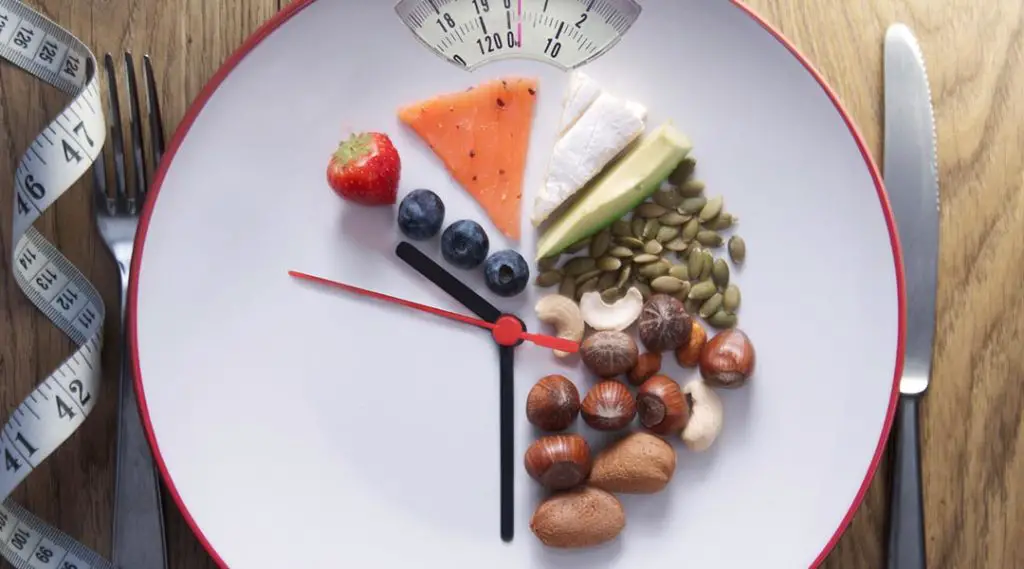
I usually do 16 to 18 hours of intermittent fasting every day. So in the morning, I’m ready to start working after just one quick coffee. And if I do just one meal a day (which happens between 5 to 10 times a month for me, it’s pretty random), I’ll be saving around 1 hour more.
If you’re able to manage your hours any way you want, you can actually gain around 1h30 to 2h a day on work. You could be home sooner, spend more time with your wife, kids, exercise, pick up a passion project, start your own company. 2 hours more every day is a lot of time!
And I didn’t even talk about the amount of time saved on cooking, which could be taken into account to. We spend so much time indulging in eating. I love eating, that’s in my top 3 favorite things, but do you really enjoy your quick salad, sandwich or microwave meal that much?
13. Save money
You’ll always have enough time to fast because you don’t need to put a second of your time in it. Well, you’ll also always have enough money to do it, since it won’t cost you a dime.
At home, we usually cook a meal for dinner and we’ll reheat this meal at lunch the next day. So every day, we’re cooking for four people, even though we’re just two. If we’re not eating lunch, we’ll be saving some money.
The money-saving aspect is not that big a deal when you’re used to preparing your meal in advance like we do, a bit more carrots, a bit more chicken, etc. But imagine you’re eating out every day? Imagine you’re buying your meal every morning? That could become pretty expensive no?
Let’s say you’re just saving 2 $ a day from skipping breakfast. In a year you’ll have saved around 700 $. Imagine eating one meal a day, you could double or triple that!
Again, saving money shouldn’t be your end goal when fasting, but it is a pretty great side effect!
14. Extend longevity
It’s been known for a while now that the less you eat, the longer you live. Many studies conducted on all types of animals, ranging from mouse to yeast cells, concluded that eating less extended longevity. Depending on the animal it could even correlate: 30% less food intake meaning 30% longer life span.
So reducing calory intake, without malnutrition, meaning not only eating less but less often, affects longevity and aging in animals and humans across the board, according to this other study.
How exactly? Well, there is no clear answer. But fasting amongst other things reduces oxidative stress, improves insulin sensitivity and alters sympathetic nervous system functions. And it also promotes autophagy.
In 2016, Japanese cell biologist Yoshinori Ohsumi won the Nobel Prize in Medicine. His researches? How cells recycle and renew their content, through a process called autophagy.
In this paper on autophagy and longevity in animals, researchers conclude with :
As we described above, accumulating evidences show activation of autophagy seems essential for longevity.
There are still being unsure exactly how autophagy regulates aging, noting that timing specific roles of autophagy, cells, and tissues should also be considered.
But there is clear evidence that autophagy affects aging and promotes longevity.
15. Clear the skin and prevents acne
This 2014 update on the subject of acne doesn’t beat around the bushes:
Diet and acne update: carbohydrates emerge as the main culprit.
I don’t have access to the whole article, but the title is pretty self-explanatory. This other study implemented a low carb diet on 43 three male acne patients between 15 and 25 years old and revealed that it greatly decreased inflammatory acne lesions when compared to the control group.
Fasting doesn’t necessarily mean low-carb, but both low-carb and fasting share a side effect. It reduces insulin resistance and improves insulin sensitivity. Insulin plays an important role in acne formation and overall skin condition.
When you’re always eating carbs, your body’s always producing insulin. Insulin triggers the release of 3 hormones: IGF-1, IL-1, and IGFBP-3. These hormones block pores, producing excess skin oil and trigger inflammation.
This study conducted specifically on IGF-1 concluded that :
IGF-1 might be involved in the pathogenesis of acne by increasing both expression of inflammatory biomarkers and also sebum production in sebocytes.
Insulin effectively promotes acne and increases sebocytes formation. Sebocytes are also one of the main symptoms of oily skin.
Reducing insulin resistance and secretion through fasting or low-carb should help cure acne, clear the skin and avoid oily skin. You can also read testimonies on people reducing, or even curing, acne with this type of diet change.
16. Help promote gut balance
I already talked about how fasting could improve digestion and reduce bloating and daily bowel-movements. One of its other effects is that it will help improve gut health.
Gut health, which is also called the gut microbiome, refers to microorganisms living in everybody’s intestines. We have around 500 different types of bacteria living in there. There’s good bacteria, necessary for the body, and bad bacteria.
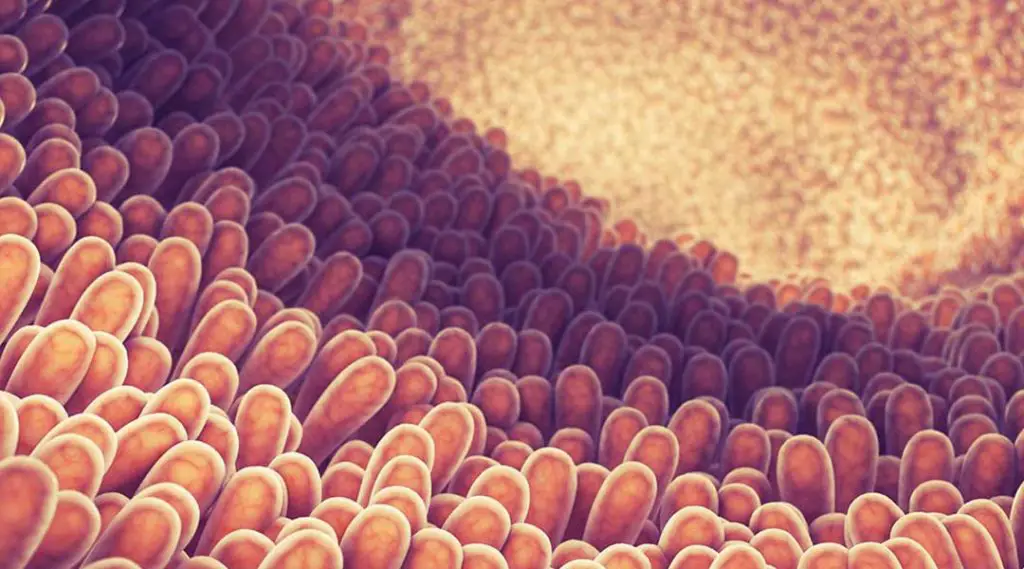
It has been found in the last years that gut health actually played a huge role in many other body functions: immune system, inflammation, allergies, mental conditions, autoimmune diseases, etc.
It’s even been found to have an impact on severe mental illnesses such as autism. The following review published in 2019 argues that improving gut health, through a better diet, could have an effect on the severity of the condition.
A good gut microbiome is a balanced microbiome, where good bacteria are not overwhelmed with bad ones. If you eat junk food or lots of carbs, you’ll help the proliferation of bad bacteria, which relishes on refined foods, sugars, and artificial sweeteners.
When you fast or do low-carb, you will effectively not be ingesting any food that could hurt your gut microbiome. And while you give your digestive system a break, you’ll give it time to cleanse and reset your gut flora.
And through autophagy, a process with which you should be familiar now, you’ll get many other great benefits: it’ll help the proliferation of good bacteria, clean toxins, and waste products in the gut, reduce inflammation and strengthen the gastrointestinal mucosal lining, among other things!
If you want to read a full account on fasting and gut health, check out my article on the subject.
17. Lower blood pressure
When our hearts contract, blood flow is being pushed out of the heart’s chamber. Every time it pumps or beats, it will put pressure on your body’s arteries, in order to transport blood to your tissues. This pressure is called systolic blood pressure.
When our hearts relax, the heart’s chamber is refilled with blood. This puts another pressure on your arteries. It’s called diastolic blood pressure.
So, in order to measure blood pressure, both systolic and diastolic blood pressures are going to be measured. Normal blood pressure is under 120 systolic and 80 diastolic. That’s what a doctor means when he says “120 over 80” for example.
If your blood pressure is too high, what exactly are the consequences? Well, blood flowing too strongly inside your vessels will, in the long term damage blood vessels walls, organ structures, and overall tissues. This can increase the risks of strokes, heart disease, kidney damage, etc.
Certain types of high blood pressure, or hypertension, can come from specific diseases of course. But in most cases, it’s not related to a medical issue. In most cases, it comes from what we call “metabolic syndrome”. It correlates with high visceral fat, high blood sugar and high harmful cholesterol (low HDL, high triglycerides).
Again, doing low carbohydrates or implementing intermittent fasting, will help reduce the effects of the metabolic syndrome through many other factors we will talk about in this article (lowering insulin resistance, reducing harmful cholesterol, help to unclog arteries, etc.).
Lower blood pressure will simply be a side effect of all these benefits. If you’re medicating about hypertension, I’m not by any means saying you should stop. But read about it, document yourself and talk to your doctor about it.
18. Reduce insulin resistance
To understand how you can reduce insulin resistance with fasting or low carb, let’s first see how insulin resistance actually happens in the body.
Depending on what you’re eating, your body will release some insulin. As you can see in this graph, fat consumption alone will release very low insulin, protein a bit more and carbs a whole lot more.
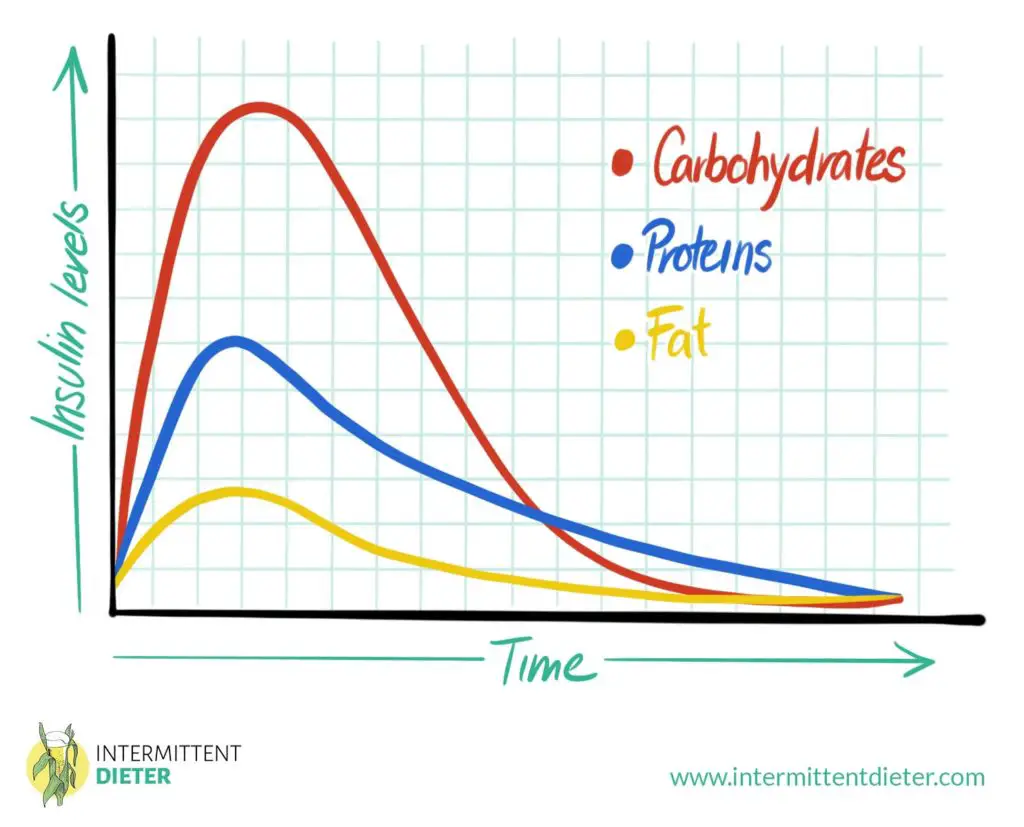
Released insulin will then use the food for three things, in this order:
- To enter mitochondria and burn it up as energy (for the muscles, brain, etc.)
- To be stored in glycogen stores in your liver for later use
- To be turned into fat and put in your fat cells if the previous both tanks are full
When you’re eating lots of carbs every day, you’re constantly spiking up insulin levels. This means you’ll always have some insulin traveling in your blood. Even when you’re not eating, you’ll keep some excess insulin in the blood flow.
Since they’ll be submitted to insulin most of the day, your cells will grow resistant to it. Just like your body grows resistant to alcohol after a while. This means your body will become insulin resistant.
Insulin resistance is one of the big causes of metabolic syndrome and can eventually lead to high blood sugar and diabetes. When fasting, you’ll increase insulin sensitivity and reduce insulin resistance.
Since you won’t be eating, insulin levels in the blood will decrease. After a while, your cells and insulin receptors might actually increase their insulin sensitivity and even go back to normal.
Many studies have been done on the effects of fasting on insulin resistance: in prediabetic patients, diabetic patients and when compared to a regular calorie-restrictive diet. And they all show promising results on the subject.
19. Decrease “bad” cholesterol
Cholesterol markers are composed of HDL cholesterol (referred to as “good” cholesterol), LDL cholesterol (“bad” cholesterol) and triglycerides. High HDL, low LDL, and low triglycerides mean you’re in low risks of CV disease.
As I said, they’re markers. Cholesterol is not the cause of cardiovascular (CV) diseases, it’s a way to measure CV risks of a patient.
With that in mind, simply lowering bad cholesterol shouldn’t be your end goal. But through fasting, you can effectively do just that.
Triglycerides are used to transport fat in the blood and they’re then stored in the cells like that. But there’s also fat floating freely in your blood. They’re called free fatty acids and glycerols.
When you’re fasting, triglycerides will be broken down into free fatty acids and glycerols to be used for the body as energy. Triglycerides are an important source of energy in the body.
Cholesterol plays another role, it’s used to repair cells, mainly cell walls, and make certain hormones, vitamin D, and digestive fluids. So again, cholesterol is not inherently bad.
So when you’re breaking down triglycerides in the blood through fasting, oxidizing free fatty acids for energy, you’ll be lowering triglycerides levels (which is good).
I will use graphs from this study conducted on the effects of alternate-day fasting on coronary heart disease indicators to prove my point. Here’s the effect of fasting on triglycerides:
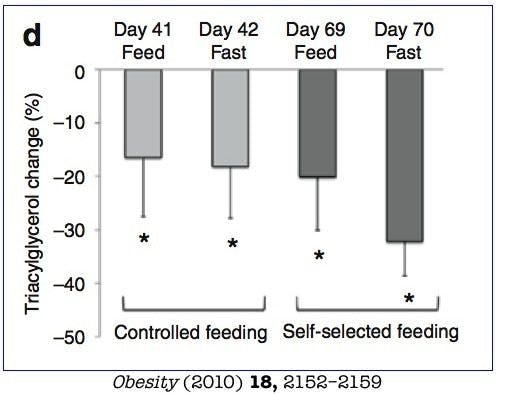
We can see an impressive 30% decrease in after 70 days of alternate-day fasting. And almost the exact same result happens in LDL levels, according to the same study:
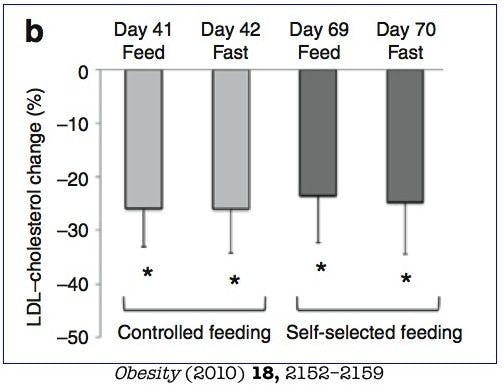
The study describing the graphs says this :
(a) Total cholesterol decreased (P < 0.05) after 4 and 8 weeks of alternate‐day fasting (ADF). (b) Low‐density lipoprotein cholesterol decreased (P < 0.05) after 4 and 8 weeks of ADF. (c) High‐density lipoprotein did not change during the trial. (d) Plasma triacylglycerols decreased (P < 0.05) after 4 and 8 weeks of ADF.
Source
It means that after 70 days of fasting, triglycerides decreased by around 30% and LDL cholesterol around 25%. Of course, drugs, such as statins drugs, can be far more effective by reducing LDL to up to 50%. But we can achieve half of the drug’s results with simple dietary changes. Not bad!
Fasting effects on HDL cholesterol are minimal though. But that doesn’t mean it’s bad, fasting will lower triglycerides and LDL cholesterol while keeping HDL levels. I would say it’s pretty impressive.
Now we know how fasting can reduce triglycerides, but how come it also reduces LDL cholesterol? Well, when your fasting, you’ll burn fatty acids as I said earlier. Since you won’t be eating anything, your body will not create new free fatty acids, and new fat.
This decrease will then impact VLDL (very low-density Lipoprotein) secretion from the liver. VLDL is created in the liver to carry triglycerides around the body, so VLDL will reduce. And while some VLDL is cleared in the bloodstream, the rest will be transformed into LDL by enzymes.
So fewer triglycerides mean less VLDL secretion, resulting in less LDL.
20. Help to unclog arteries
In my previous point about cholesterol, I mentioned that one of its roles was to repair cells, mainly cell walls.
When a blood vessel or arteries suffer from cracks or lesions, cholesterol will come to the rescue and, coupled with calcium, it will create plaques to “heal” the damaged organ.
What’s crazy is that this natural healing process coming from your body itself is actually the root cause for arteries clogging. When blood vessels constantly suffer from inflammations or cracks, calcium plaques will accumulate, resulting in clogged arteries.

What causes the lesions at first? You might say high cholesterol, you might say too much fat.I would have said that too a while ago.
But it’s actually insulin resistance, low vitamin C and high blood pressure, all coming mostly from high carbs, especially sugars, diet.
If you an to know more about the science behind this, you can take a look at my complete article on the subject of fasting and arteries clogging to know more.
The idea behind fasting being able to unclog arteries, is simply that, again, it will increase insulin sensitivity. If you’re not eating, you’re not producing insulin, you’ll have lower insulin levels and after a while, insulin resistance will reverse.
Simply because your cells won’t be exposed to insulin 24/7 anymore. Insulin sensitivity will increase and blood pressure decrease.
As for vitamin C in the complex (not pills or synthesized vitamin C, but the one found in fruits and vegetables) depletion, that could also have an impact and you should combine fasting with a healthy diet, of course.
Reducing insulin resistance and blood pressure through fasting will help reduce lesions and inflammations of the blood vessels and arteries. Fasting to unclog arteries is a big first step, check out my article to see other things you can do in order to help reverse this condition.
21. Help against metabolic syndrome
Suffering from metabolic syndrome means you’re at risk of developing heart diseases, stroke, and diabetes. This usually comes as an aggravation of insulin resistance and other risk factors.
Metabolic syndrome also means hypertension, high blood sugar, excess visceral fat, abnormal cholesterol, and triglycerides levels. As you can see, we’re always circling around the same problems. And all these conditions are interlinked.
Meaning implementing fasting will help increase insulin sensitivity, it’ll decrease triglycerides and LDL cholesterol, decrease blood pressure, help with arteries clogging, and make you lose weight.
In this study, they stated that simply implementing 10-hours restricting eating window (meaning 14-hours intermittent fasting), when combined with traditional medication, was enough to reduce abdominal fat, increase weight loss and lower blood pressure and cholesterol.
Since metabolic syndrome comes from excess fat in the body, excess sugar and carbs consumption, fasting can effectively help reduce all this. As always, combined with healthy eating habits it will do marvels.
22. Reduce risks of a cardiovascular event
A study was conducted between 2004 and 2006 on 448 Mormon patients. The purpose? See how fasting, which is part of their religion, impacted their heart health. They saw that fasting regularly was reducing the risks of coronary disease by 50 to 60%. But the fact that Mormons also restrict from tobacco definitely has an impact on the results of this study.
I could also refer back to this study I mentioned earlier, where cardiovascular disease risk diminished by simply implementing a 10-hour eating window. Intermittent fasting for short.
Again, through the reduction of triglycerides and cholesterol levels, decreased blood pressure, coronary heart disease risks will lower and heart health will get better.
Check out this study on the effect of a three-weeks fast on extremely obese patients or this study on the impact of implementing fasting in your everyday life in order to reduce risks of coronary heart diseases and diabetes.
23. Help keep a healthy liver
Fasting is known to help liver health, especially to prevent conditions like fatty liver diseases. While this is known, exactly how fasting was able to help this condition wasn’t known until recently.
First, there is this 2016 study in which they found that upon food deprivation, a certain type of protein in the liver, called GADD45β, was produced to adjust the metabolism in the liver.
The greater the hunger, the more of this specific protein secretion in the liver. This protein seems to be responsible for controlling the absorption of fatty acids in the liver. In the study, mice who lacked the corresponding gene were more at risk of developing fatty liver disease.
But when the protein was restored, through fasting, which is putting stress on the liver that stimulates GADD45β production, fat content in the liver normalized and sugar metabolism improved.
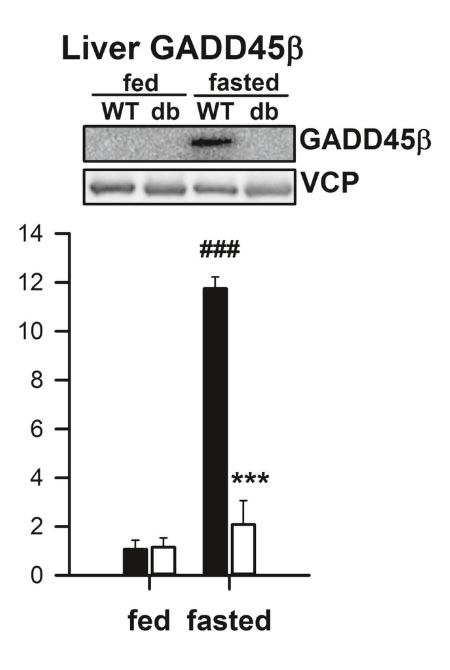
The study not only was able to see this happening on mice, but this effect was also confirmed in human beings: low GADD45β levels are accompanied by increased fat accumulation in the liver and elevated blood sugar levels.
Another recent study, conducted in 2020, saw that intermittent fasting was able to change liver enzymes. Especially another protein called HNF4-(alpha) which seems to get inhibited through fasting.
This impacted blood protein levels in inflammation and bile synthesis. Which in turned proved to change fatty acids metabolism in the liver for the better.
While the study states that this discovery could lead to the creation of new medicines, they conclude that this new information can be used in future studies to determine the best fasting periods to impact protein responses in the liver.
24. Reduce oxidative stress
Oxidative stress occurs when unstable molecules, known as free radicals, are produced in a higher-than-normal manner. Free radicals carry highly reactive electrons and when reacting with other important molecules (such as proteins or DNA), they’ll damage them.
Oxidative stress can be caused by many things:
- Smoking
- Disruption of the circadian rhythm
- Psychological stress
- Infection
- Inactivity
- etc.
The problem is that constant oxidative stress can lead to important oxidative damage in your cells, promoting aging and chronic diseases.
There have been quite a few studies on the subject of fasting and its effects on oxidative stress, all leading to the same conclusion: it’ll help enhance resistance to oxidative stress.
As for how it is still a bit unclear, but the fact that fasting is promoting autophagy is a pretty good lead. In this study on the effect of autophagy on oxidative stress and DNA damage, we can read the following in their conclusion:
Autophagy is able to limit cellular damage through the maintenance of energy homeostasis, oxidative stress reduction, and elimination of damaged proteins and organelles
So, fasting promotes autophagy which in turn limits cellular and DNA damage through reducing oxidative reduction. What’s more, this process will also replace and recycle damaged cells.
25. Reduce inflammation
Inflammation is not a villain, it’s triggered when your body needs to fight body infections. But as we also know, too much inflammation in the body is bad and it can help lead to various diseases and conditions such as cancer, heart, disease, asthma, type 2 diabetes, obesity, etc.
One of the causes of too much inflammation in the body is the way we eat. We eat too much and too often.
This study conducted in 2019 had patients not eating between 12 and 3 p.m. on the first day and between 8 p.m. on the same day and 3 p.m. the next day. On both days, they took blood samples at 3 p. m. to test white blood cells.
White blood cells are known as protection against infection. Typically, white blood cell levels in the body indicate levels of inflammation. They especially took a look at specific cells that cause inflammation called monocytes.
What they discovered is that between the two days, the two samples showed a strong drop in monocytes.
The conclusion to the study is not that you should fast or starve yourself to reduce inflammation, it’s more that people eat too much and too often on an everyday basis which causes high levels of inflammation in the population.
This other study from 2019 indicates that intermittent fasting was able to reduce another pro-inflammatory protein called cytokine.
And there are other studies on the subject of inflammation and fasting, all resulting in the same conclusion that eating less and, more importantly, less often will reduce overall inflammation in the body.
26. Reduce anxiety and depression
Before talking about fasting, I would like to address depression and how it manifests, based on many studies, for you to understand how any type of fasting could help.
As I said in my previous point, when you’re sick, your body will trigger inflammation. The purpose of inflammation is to fight the infection. As a result, you’ll feel tired, in a bad mood, you’ll suffer from sleeping and eating disorders, you won’t have the energy or motivation to do anything, etc.
Those are not side effects of the infection itself, they are side effects of increased inflammation in the body. As you can see, the symptoms of inflammation I just described, are pretty close to the way you feel when you’re depressed.
That’s because when you’re depressed, you actually have higher body markers for inflammation by up to 50%. The risk of depression actually increases with the risk of inflammation.
Various studies tested correlations between depression and inflammation. In this study, when injected with an inflammation-inducing substance, patients showed greater increases in a depressed mood, feelings of social disconnection and inability to feel pleasure.
Another condition that puts you at a higher risk of depression is obesity. The higher the body mass index, the higher the risks of depression. But also higher BMI, means higher inflammation according to this study.
Because fat adipose tissues are actually known to produce pro-inflammatory cytokines (which I mentioned in my previous point). This other study suggests that the link between metabolic syndrome and depression could be inflammation.
I know, in many cases depression doesn’t come from your diet or sleep habit, but from a tragic life event, a trauma, etc. And that’s perfectly right, it can come from any sort of psychological stress.
Again, psychological stress is a known trigger for inflammation. In this study, mice were stressed with isolation and it revealed they secreted an increased amount of cytokines.
This other study conducted the Trier social stress test on patients. It revealed a 2 to 4 times increase in cortisol (the stress hormone) and also an increase in plasma concentration (IL-6) of inflammatory cytokines.
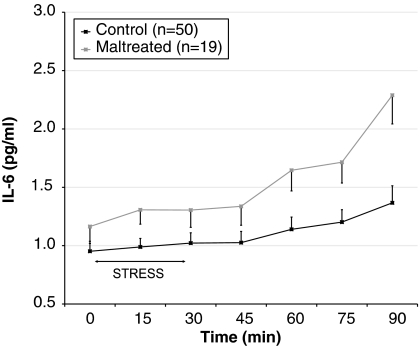
To end this exposé on inflammation and depression, let’s ask ourselves why stress would put our body in a state of inflammation. For that, we must go back to our hunters-gatherers ancestor: they only experienced stress when in danger of being wounded or killed (animals, other tribes, meteorological events).
So the body could have originally triggered inflammation as a way to prepare itself to fight infection. If stress = wound or infection, then stress = increased levels of inflammation.
To end on this subject, how does fasting enter the mix? Well, as I mentioned in my previous point, fasting can help fight inflammation. On the contrary, eating too much and too often promotes inflammation.
27. Increase growth hormone secretion
Contrary to certain believes, fasting won’t shut down your body. When you’re fasting, counter-regulatory hormones such as adrenaline, noradrenaline, and cortisol will be released, in order to keep your body ready for action.
Another counter-regulatory hormone is also released during a fast: growth hormone. Growth hormone secretion increases by 2 or 3 times on the first day of fasting and put to the fifth day.

Those higher than-normal secretions mostly come as a direct response to insulin levels dropping in the body. Which means when you break your fast, your body will have spiked up growth hormone during this time. And breaking the fast will spike up insulin which, combined with growth hormone, will promote protein synthesis.
Meaning when your fast, you prepare your body to be more efficient at muscle growth, through protein synthesis. Check out my complete guide on fasting and muscle growth to know more.
Other benefits of high secretion of growth hormone include:
- Improved lean body mass
- Increased bone density
- Increased skin thickness
- Promoting weight loss
- Better mood, cognitive functions, and better sleep
28. Burns Fat And Promotes Weight Loss
Yes, I’m really going to talk about burning fat with fasting because when I say complete list, I mean complete list! If you have any interest in fasting, you will already know how this works. But I’ll summarize the process anyway.
When you’re fasting, meaning you restrict not the amount you eat but when you eat, your body will find himself depleted of glucose to run on since it usually relies on the ones you’re ingesting.
Ingested glucose, proteins and fat are either used for energy right away, stored in glycogen stores in the body (liver, muscles, etc.) and, if all of the stores are full, stored as adipose tissue, fat, in the body.
If you don’t eat for a while, your body will tap into your glycogen stores first for energy. Think of it as your fridge. Need some energy? Just get up and get to the fridge, where you stored stuff for immediate consumption.

What happens when glycogen stores, the fridge, is empty? Well, your body is pretty smart, it stored a lot of energy in the form of fat all-around your body. We’ll call that the cellar. Except as smart as the body is, it’s also pretty lazy.
I shouldn’t say lazy, I should say it’s used to simply go to the fridge or get fed right away. And your body is also really good at saving energy, going to the cellar, turning body-fat into energy, consumes energy and if your body is not used to doing that, it won’t happen right away.
Fasting, by depleting energy stores, will force your body’s whole machinery to turn to fat for fuel instead of glucose. This state is known as ketosis. In this situation, your body will turn fat into ketone bodies as fuel for the brain and break down fatty acids and amino acids in your body as energy for the whole body.
Fasting will make you use your fat stores as energy. The more you’ll do it, the more you’re metabolism will get used to doing it, the easier it will get, the faster your metabolism will be, the more fat you’ll lose.
29. Preserves Muscle Tissue
While we’re talking about burning fat, you might wonder if fasting would also burn muscle. One possible cause of muscle loss is starvation. And you might think fasting is a form of starvation, but it really is not.
Low calory diet, meaning voluntarily inducing fewer calories intake that your body actually needs every day, while eating 3 to 5 times a day, that’s a form of starvation. Here’s a definition of low calory diet I found on Healthline :
What people generally refer to as “starvation mode” (and sometimes “metabolic damage”) is your body’s natural response to long-term calorie restriction. It involves the body responding to reduced calorie intake by reducing calorie expenditure to maintain energy balance and prevent starvation.
Source
Take a look at this study on low calory diet, exercise and muscle loss. On this type of diet, even when you’re actually exercising, you will lose muscles. In starvation mode, your body will try to reduce energy expenditure, since it’ll think you’re in an environment where food is scarce.
Muscles being very energy costly, the body will eventually start breaking it down in order to match energy expenditure to your caloric intake.
When you’re fasting, you’re actually eating less frequently, kind of like our ancestors were and your body is used to relying not only on the food you consume but also on ketone bodies and fatty acids in your body. Your fat stores.
Here’s an example of a study conducted on patients doing alternate day fasting for 70 days. They measured lean body mass (bones, muscles, etc.) every day. Do you know what they discovered? It didn’t change one bit.

The single worst thing you can do which will make you lose muscle is to be sedentary and don’t exercise. Implementing fasting or even low carb won’t cause any muscle tissue to get broken down. None.
If you want to know more on the subject of muscle and fasting, check out this beast of an article that I wrote on the subject.
30. Boost Your Metabolism
I talked about it briefly when mentioning weight loss, but one of the great benefits of fasting is that when done regularly it’ll improve your metabolism. What exactly does “boosting the metabolism” means?
The metabolism is not an organ, it’s everywhere in your body. It refers to a multitude of chemical processes that occurs in your cells. The main purpose of your metabolism is to turn calories to energy.
Your body’s efficiency at burning calories for energy is what we call the metabolic rate. This measure will vary from one day to another, depending on your activity level. Basal metabolic rate, meaning the number of calories needed for your body to properly function (blood circulation, breathing) stays fairly steady from day to day.
You certainly have heard (or even tried) about someone who did a calory restricted diet for a while, achieved their goals and when they started eating normally again, regained all the weight.
This is because a calory restriction diet slows down your metabolism. Your body is trying to preserve energy stores because it thinks you’re in a place where food is scarce. sYou eat 3 to 6 times a day, never to satiety, and you end up with fewer calories than
31. More weight loss in the abdominal cavity
When we’re trying to lose weight, especially men, we often obsess about belly fat. We also amusingly calling that the “beer belly”. And it is, visceral fat generally comes from fat forming around the organs, it is not a natural process in the body.
But through alcohol or refined carbs and sugar metabolization in the body, check my article on alcohol and fasting for the whole process, visceral fat will accumulate. It’ll also promote fatty liver, but that’s another story.

So how fasting can help reduce visceral fat? Well, it’s not specifically that it targets visceral fat, it’s more that losing visceral fat is harder than other types of fat, and fasting is good at it.
To be a bit more “scientific” about it, fat cells have 2 important receptors :
- Alpha-2: They will prevent fat burning. These receptors tell the cell to store fat for later use
- Beta-2: Those will promote fat burning by telling the cell to release the fat inside into the bloodstream
One of the effects of fasting as I already stated is that it will increase insulin sensitivity and reduce insulin levels in the body. And one of the side effects of low insulin is that it will inhibit alpha-2 receptors and activate beta-2, this means it will promote fat burning.
What’s interesting to know is that the abdominal cavity contains more alpha-2 receptors than elsewhere in the body. Which explains why it is so hard to burn visceral fat.
But with this ability to activate beta-2 receptors and shut down alpha-2 receptors, through low insulin levels, burning belly fat is made possible, and efficient, through fasting. Low-carb diets will have the same effect.
32. Never Worry About Your Weight Again
Are you ready? Okay, if you experiment with fasting and if you’re able to implement it in your life through any type of intermittent fasting or through prolonged fast: you will never have to worry about your weight again.
You will never have to worry about your weight again!
I’ll let that sink in for a bit, but to me, it is the single most important benefit I get from fasting. I’ve never been obese, I discovered fasting when I was around 30 pounds fatter than I am now.
And I didn’t lose 30 pounds in six months, I did it in around a year. I wasn’t in a hurry, I implemented 18 hours intermittent fasting every day and did 6 days fast in the middle and there you go.
Now that I’m used to doing that, I never worry about my weight. Maybe I’ll gain some over Christmas, but it’ll eventually go away and if I want to boost the process I can always do one meal a day for a while.
Because it’s that easy.
When talking with people I always hear “I cannot do that it would be too hard”. And every time someone I know tried it, they were able to implement 18 hours intermittent fasting in 2 to 3 weeks tops.
As I always say to people interested in fasting, you don’t have to go all-in right away.
Start with eating less at breakfast, maybe delay it by an hour, just do it progressively. I know it can be really hard depending on your condition, but as hard as it may seem at first, you’ll see that it gets a whole lot easier.
Once you’ll be able to not eat for a whole day you’re done. You’ll be able to experiment with several days fasts too. If you know you can do it, you’ll realize you can control your weight easily.
Even if you’re obese, once you can do one meal a day routine, you’ll see those pounds disappear a little bit more every day. And as I went over and over in that article, it’s really not just about weight, but also your health.
You’ll eventually end up like me, never having to worry about your weight again. Coupled with more than 30 other potential life and health benefits, you have no excuses!

